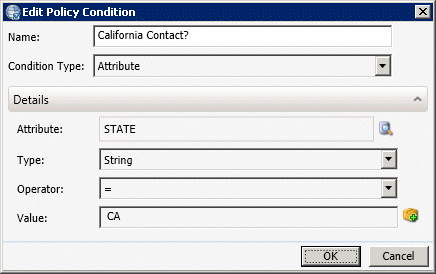- Contents
Interaction Dialer Manager Help
Understand Policy Conditions and Behaviors
A Policy is a per-contact rule. Policy Sets provide fine control over the processing of individual contact records, and allow for implementation of legislative requirements that involve per-contact behavior. Policies also fire notification events based on individual contact results. Policy Sets are optional, but in practice they are frequently used. Policy Set objects are created in the Policy Sets view in Interaction Dialer Manager.
A Policy is made up of conditions and behaviors. Conditions determine when the Policy applies. Behaviors embody what event occurs when the conditions are evaluated to 'True' (either all of them or any of them depending on a Boolean configuration option).
A Policy can be established to adhere to a Legislative requirement. An example might be never to abandon a contact more than once. In this case, the number of abandons would be the policy condition and the behavior could be to skip the call, mark the call so it is never called again, or schedule the call for a "precise" callback (one that cannot be abandoned).
Another example might be to prevent calls to California from ever being abandoned. To do this, you could create a policy with a condition of State = CA, and set its behavior to precisely dial the contact. When the policy condition is true, an agent will be "set aside" before Dialer places this call, ensuring that the call will not result in an Abandon.

Precision Dialing selects an available agent—one whose status is Available when there are no further ACD calls that might be routed to that agent. Next, the Dialer checks to see if any precision dial calls are queued. If so, it marks the agent as "Awaiting Callback" and places the call. When the call connects it is blind transferred directly to the agent. If the call does not connect, the agent is returned to an Available status and new calls are generated.
Policies make it easy to precision dial any contact in the contact list. No changes to contact list data are required. Instead, create a policy that specifies conditions when precise dialing needs to occur. Dialer will process calls normally until a policy condition deems that the call needs to be dialed precisely.
Control when conditions are evaluated by setting the Policy's evaluation type
A policy condition can be evaluated before the call is made, when a call analysis result is available, or after the call is finished. Each policy is defined with a particular policy evaluation type that determines when conditions in the policy are evaluated. The possible evaluation types are Pre Call, Call Analysis, and Disposition. Policy evaluation type is determined according to the tab under which the policy is created. This timeline illustrates when each policy type will be evaluated, per contact list record:

In Interaction Dialer Manager, policy evaluation type is configured after a policy entry is added, before any of its conditions are defined, by selecting a PreCall, Call Analysis, or Disposition tab. In the example below, the Details tab was selected since the example policy behavior precisely dials contacts in California.

The options for configuring conditions and behaviors are the same, regardless of which evaluation type tab is selected. Evaluation type merely determines when the policy should be evaluated.
|
Policy Evaluation Type |
Description and Usage |
|
Details |
Evaluated before the call is made. Precall policies allow changes to the way the call is dialed, and any other processing before the record is dialed. |
|
Call Analysis |
Evaluated immediately after the Call Analysis result is determined, but before the call is sent to an agent or dispositioned, or right after the call is placed if Call Analysis is off. Call Analysis is a CIC process that analyzes a connection to determine if the call reached a live person, a fax machine, or an answering machine, and whether or not an agent is available to process the call. Call analysis policies allows control of deliver of the call to an agent, early disposition of a call, and rescheduling according to call analysis results. Call analysis policies are not available to preview campaigns. |
|
Disposition |
Evaluated after the call is finished and the disposition is ready to be updated in the ContactList. This is the final opportunity to make adjustments to the contact record or rewrite a disposition. |
The next figure illustrates how the precise dialing behavior would be set for the policy example that precisely dials contacts in California.

In this example, a PreCall policy defined with an Attribute Condition (State = "CA") that states that if the contact is from California, apply a Call Routing Behavior that requires Precision Dialing for this contact. Precision Dialing will not place this call unless an agent is available.
In a similar way, Policies can carry out behaviors for Priority Calls (records inserted into the contact list on the fly). A "Priority Call" call category in the Policy Set Item Condition configuration allows a policy to examine call category information for the current contact record, so that a policy can carry out behaviors if the call type is a Priority Call. See Priority Dialing for details.





